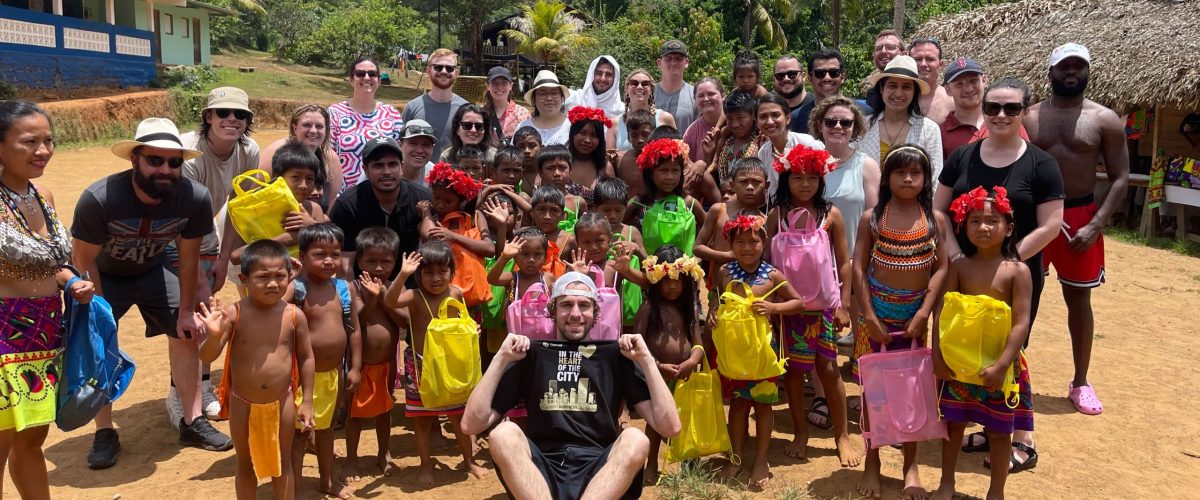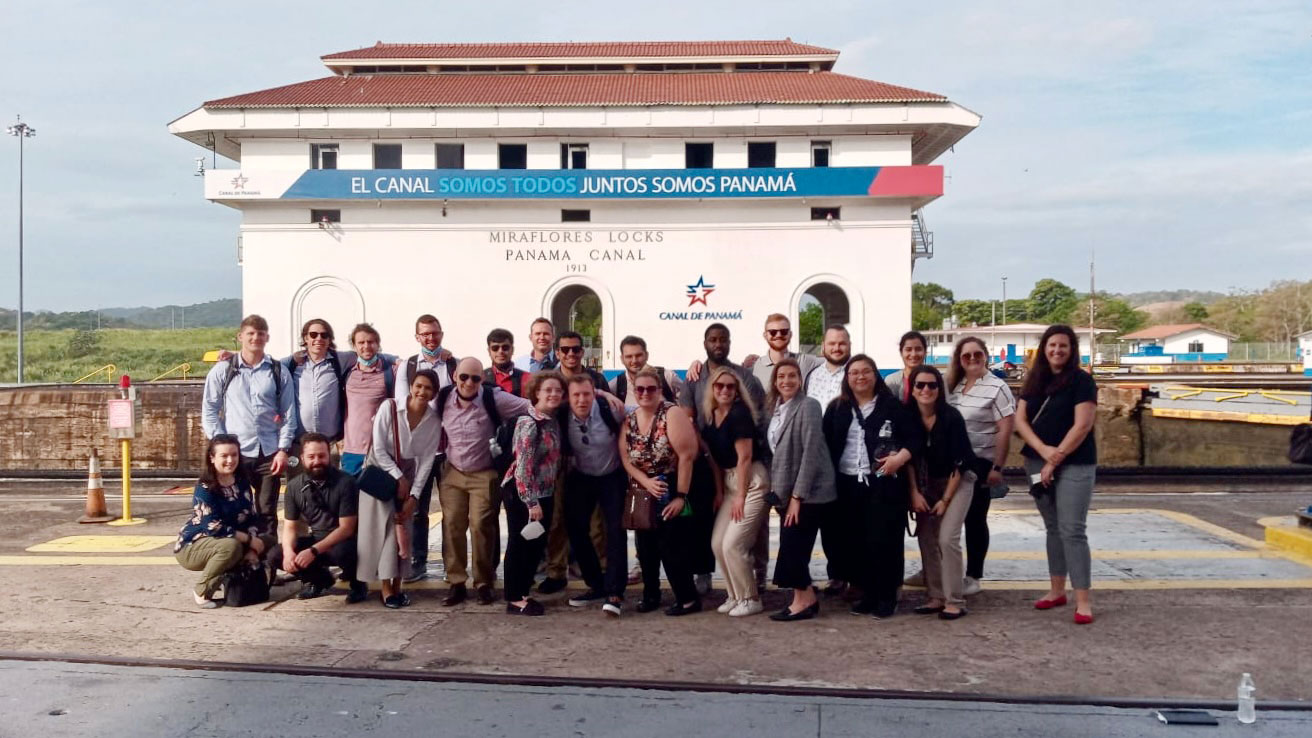
By Danika Gutierrez
Edited by Christina Horn
In the time of COVID-19, travel has become significantly difficult for many individuals and nearly impossible for school programs globally. Study abroad programs around the world scrambled for the past two years to make it possible for students to learn internationally with little to no luck. Fortunately, CU Denver rose to the challenge and kept the One Year MBA international component active by making it possible for 23 students and their program coordinators to travel aboard. This year’s destination, Panama in Central America.
The trip to Panama was structured as a required course titled AMBA 6540- International Business Abroad taught by Jill Lohmiller and was the first MBA-level course to be held abroad since the global shutdown in 2020. Throughout the eight-day journey to different areas in Panama, students were required to reflect on their experiences by writing in a journal and creating a presentation on a theme they learned about in Panama. These presentations were shared with their peers on the last day in the country. Students were also tasked with writing an overall reflection of their experience after arriving back in Denver. Much to the cohort’s surprise, Panama is rich in resources and continues to be one of the big players in supply chain logistics for the Americas. Panama’s proximity to the U.S made it easy for our cohort to adjust to the time zone (just a one-hour time difference between Panama and Denver) and meant that many locals spoke English. This made it possible for us to converse with many Panamanian business leaders who discussed their experiences in different industries. When discussing why she chose the destination for the one-year MBA experience, Jill Lohmiller stated that “Panama offered a unique opportunity to travel to a single country safely, where students could experience a diverse view of global business during a time with global supply-chains and logistics are part of daily business conversations.” 
Each day in Panama, was packed with meetings with business leaders and adventures that gave the students new learning opportunities as the cohort immersed themselves in the Panamanian business culture and lifestyle. From the Panama Canal to the Colon Free Trade Zone, the OYMBA cohort took full advantage of the international course by doing four things: displaying professionalism, showing up mentally and physically, being curious, and keeping a positive attitude. Additionally, all students followed public-health guidelines to keep themselves and others safe and healthy throughout the trip. As a result of these behaviors, everyone returned home to the United States on time and without any health-related issues.
Danika Gutierrez, a One-Year MBA student, reflects on her time in Panama and how the trip changed her perception of global business practices:
“Much like the rest of the cohort, I didn’t anticipate Panama being an option for the course abroad. However, one of the main reasons why I chose to attend CU Denver for my MBA is because of the required international course, so I was excited to travel, nonetheless. As someone who has only traveled to two countries in their lifetime, Panama was the perfect opportunity to immerse myself in a completely new culture, observe the local people’s lifestyle, and learn from business leaders about the operations and logistics in the country”.
The speakers throughout the trip were all very knowledgeable. Domingo Latorraca, a partner of a company called Eleménte Inc., offered an incredible insight into Panama’s economy and the challenges the country faces today. Latorraca emphasized the importance of “doing good” for those who are struggling due to the pandemic shutdown and gave some calls to action for those in power, such as fixing the unemployment and money laundering issues that plague the country.
In addition to gaining insight from various speakers throughout the trip, students also got to see some elements of daily business operations. For instance, the Panama Canal, which is a lock-type canal that stretches nearly 48 miles, plays a significant role in global trade and connects the Pacific Ocean with the Atlantic Ocean. About 14,000 ships pass through the canal every year. The entire cohort was initially shocked to see the vast size of the canal and captivated by the ships being proceeded to pass through. It was not only the process that was mind-blowing but also the sheer size of the ships passing from one ocean to the other. In this instance ships that were considered “small” were comparable to the size of a cruise ship carrying hundreds of containers the size of two school buses stacked on top of one another.
On top of experiencing the canal, students got to explore the port of Colon, which also plays a significant role in global trade. The differences in the businesses on the Atlantic side compared to the Pacific side of Panama were shocking. When in Colon the businesses on the Pacific side looked much more developed than those on the Atlantic. The Colon Free Trade Zone, which is the biggest free-trade zone in the Western Hemisphere, was almost overwhelming with endless blocks of shops each of enormous size. This makes it handy for business owners around the world though as the sky’s the limit there.
Visiting the Embera Village was the last adventure exploring Panama. The village, located along the Chagres River, was home to about 150 indigenous people who welcomed tourists with open arms. The cohort learned many of their everyday customs, as well as their culture—we also got a demonstration of how they craft items using the limited resources that are available. Fortunately, for some of the shopaholics in the cohort, they offered gifts for purchase, such as jewelry, wooden carvings, and woven baskets, all beautifully crafted by hand. The unique gifts will always remind the students of the Embera Village and the hospitality they showed us that day.
For the last full day of our trip, the cohort spent most of our morning teaching each other what we’ve learned in the past week. Students had about five minutes each to discuss one consistent theme they learned during our meetings and use the time to share their perspectives. Topics that were discussed included everything from Panama’s government structure to sustainability initiatives in Panamanian businesses, to the pandemic’s impact on the country. Students offered unique insights on their theme and taught each other something new that day.
For the students, much of the learning in Panama also revolved around what they saw throughout the country. You see high-end industrial areas all the way to the slums in Panama and the differences between the two are so apparent that it was devastating to see. Panama is a beautiful country and carries so much potential to be powerful; however, living and working conditions continue to be inconsistent throughout. For instance, an apartment complex would look cramped, run-down, and poorly maintained but another building the next block over would look immaculate. This is prevalent everywhere in Panama Needless to say, the conditions of this beautiful country are saddening.
Danika reflects on her time in Panama:
“I’ve made so many wonderful memories and learned so much from the business leaders as well as my cohort. Without a doubt, the trip to Panama has strengthened our bond with one another and I’m forever grateful to be a part of an incredible cohort. Overall, I’ve learned a lot about international business through the speakers and everyone on the trip will certainly keep this Panama experience near and dear in their hearts. I know I will.”


